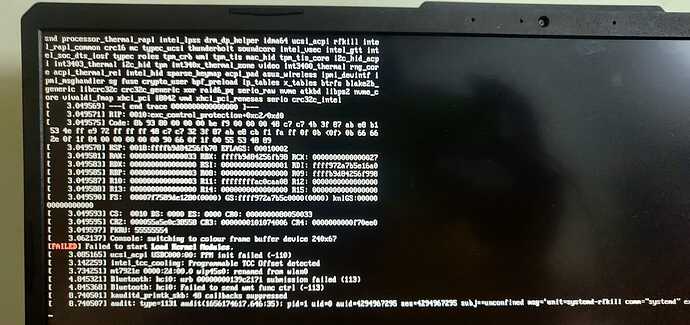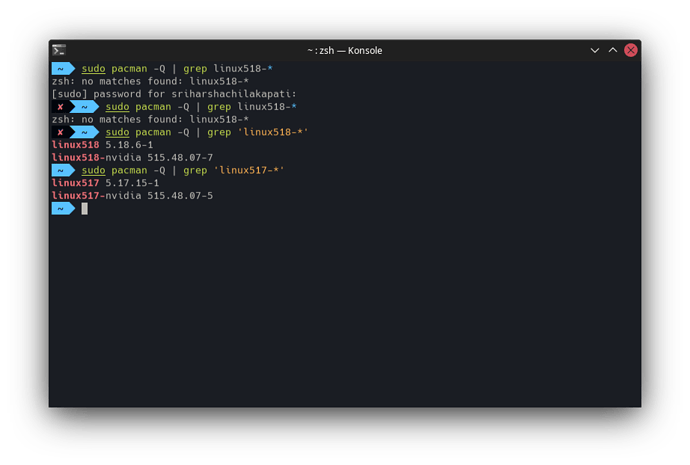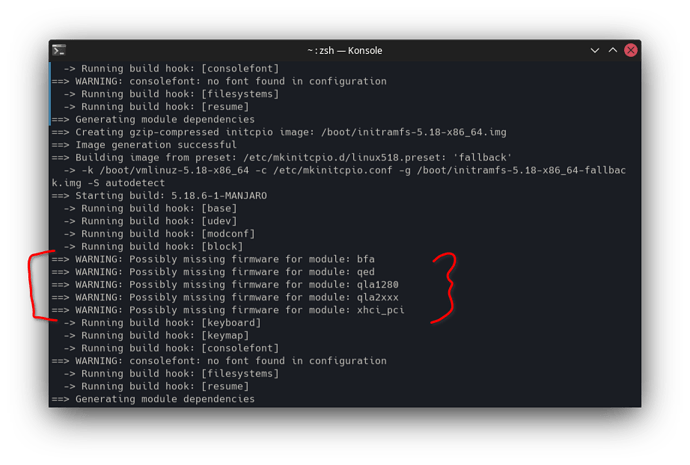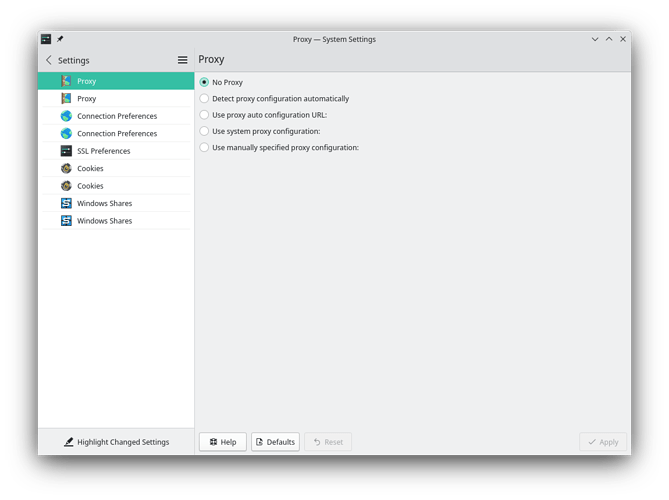I don’t see xfce-sx-settings in the repositories nor in AUR, so i highly doubt it is needed by anything.
After I updated to the stable Kernel and rebooted the screen was black.
I went into grub, had it boot from terminal.
The problem was ACPI, the symbols from the BIOS were not recognized.
The system info is:
System Information
Manufacturer: LG Electronics
Product Name: 14Z90N-VA76K
Version: 0.1
ACPI Kernel Argument
forum manjaro org t how-to-choose-the-proper-acpi-kernel-argument 1405
I then set
GRUB_CMDLINE_LINUX_DEFAULT="acpi_osi='Windows 2019 ....'
rebooted and it seems to work fine.
There is no bios update for the mainboard, the above seems to be a work around
I started having an issue with the Steam game Warframe, which led to finding out Vulkan no longer worked.
vulkaninfo
ERROR at /build/vulkan-tools/src/Vulkan-Tools-1.3.217/vulkaninfo/vulkaninfo.h:231:vkEnumeratePhysicalDevices failed with INCOMPLETE
hostnamectl
Operating System: Manjaro Linux
Kernel: Linux 5.18.6-1-MANJARO
Architecture: x86-64
Hardware Vendor: Gigabyte Technology Co., Ltd.
Hardware Model: X570 AORUS MASTER
Firmware Version: F34
cat /etc/lsb-release
DISTRIB_ID=ManjaroLinux
DISTRIB_RELEASE=21.3.1
DISTRIB_CODENAME=Ruah
DISTRIB_DESCRIPTION="Manjaro Linux"
mhwd -li -d
NAME: video-linux
ATTACHED: PCI
VERSION: 2018.05.04
INFO: Standard open source drivers.
PRIORITY: 2
FREEDRIVER: true
DEPENDS: -
CONFLICTS: -
CLASSIDS: 0300 0380 0302
VENDORIDS: 1002 8086 10de
also, there was this oddity ,when running this with sudo:
sudo vulkaninfo --summary
error: XDG_RUNTIME_DIR not set in the environment.
ERROR at /build/vulkan-tools/src/Vulkan-Tools-1.3.217/vulkaninfo/vulkaninfo.h:231:vkEnumeratePhysicalDevices failed with INCOMPLETE
ls -l /usr/share/vulkan/icd.d/
total 16
-rwxr-xr-x 1 root root 615 Jun 22 01:15 amd_icd32.json
-rwxr-xr-x 1 root root 611 Jun 22 01:14 amd_icd64.json
-rw-r--r-- 1 root root 149 Jun 16 13:49 radeon_icd.i686.json
-rw-r--r-- 1 root root 147 Jun 16 13:48 radeon_icd.x86_64.json
cat amd_icd64.json
{
"file_format_version": "1.0.0",
"ICD": {
"library_path": "/usr/lib/amdvlk64.so",
"api_version": "1.3.216"
},
"layer": {
"name": "VK_LAYER_AMD_switchable_graphics_64",
"type": "GLOBAL",
"library_path": "/usr/lib/amdvlk64.so",
"api_version": "1.3.216",
"implementation_version": "1",
"description": "AMD switchable graphics layer",
"functions": {
"vkGetInstanceProcAddr": "vk_icdGetInstanceProcAddrSG",
"vkGetDeviceProcAddr": "vk_icdGetDeviceProcAddrSG"
},
"disable_environment": {
"DISABLE_LAYER_AMD_SWITCHABLE_GRAPHICS_1": "1"
}
}
}
other parts of my system appear to be using 1.3.217 instead:
find /usr/lib/ 2>/dev/null | grep 1.3.217
/usr/lib/libvulkan.so.1.3.217
this appears to have been fixed by uninstalling amdvlk and lib32-amdvlk, as vulkan-radeon appears to also have been providing vulkan-driver.
Installed latest stable branch from ISO new after some testing of Fedora on my device.
So far all good, but i was facing that /var/lib/sddm not writable error.
Got it solved wiht a solution posted earlier in this forum.
Not sure if it’s related to the newest version, but i did not have it with a previous release.
I seem to have the same issues:
When starting games through WINE or GE-Proton I get a WINE-pop-up with:
Failed to initialize graphics.
Make sure you have DirectX 11 installed, have up to date
drivers for your graphics card and have not disabled
3D acceleration in display settings.
InitializeEngineGraphics failed
Game seems failing to use Vulkan.
I have updated the kernel to 5.18.6-1 and immediately I started noticing that the system fails to load kernel modules.
However, I can boot completely fine with Kernel 5.17, so the system is definitely usable.
Any ideas on how to debug this issue? I’ll start a separate thread with all the required details so as to not derail this topic.
Hardware:
- ASUS TUF GAMING F15 Laptop
- Intel i5
- NVIDIA 3060 Ti GPU
Please let me know what all relevant details are needed and I’ll make a separate thread.
Can you post sudo pacman -Q | grep "linux518-*" and sudo pacman -Q | grep "linux517-*"?
Seems like there are some Kernel modules missing.
Problem is NVIDIA as usual?
installed kernel modules should be:
linux518 / linux518-headers / linux518-nvidia
(re-)installing via pamac will do the trick (hopefully)
I don’t have linux518-headers installed, so no idea if that will help. Should I run mkpcinitio again?
Install it and boot again with 5.18
Or reinstall the kernel (5.18) with
sudo mhwd-kernel -i linux518
This will install dependencies from previous kernel as well.
Says nvidia-518 is missing. Headers too…
I removed the pacman cache first with pacman -Scc and then removed the modules pacman -R linux518 linux518-nvidia and rebooted using 5.17 kernel.
Then I executed sudo mhwd-kernel -i linux518 and got the following output:
Any issues for these? I guess I’ll now install pacman -Sy linux518-headers manually and reboot to see what happens.
New warnings when building the fallback initcpio - Possibly missing firmware for module: bfa, qed, qla1280, qla2xxx
That’s due to the recent changes to the linux-firmware package. Note these are warnings, not errors. You only need those firmwares if you have Mellanox Spectrum switches, Marvell devices, Qualcomm SoCs, Cavium LiquidIO server adapters, QLogic devices and Broadcom NetXtreme II 10Gb ethernet adapters. if you have that hardware you can install linux-firmware-qlogic to get rid of those warnings. If you do not have that hardware you can safely ignore those warnings.
pamac install linux-firmware-qlogic
EDIT: and pamac install upd72020x-fw (for xhci_pci issue)
![]() but I wouldn’t recommend installing firmware from AUR unless you have hardware components that need it. You can just ignore it.
but I wouldn’t recommend installing firmware from AUR unless you have hardware components that need it. You can just ignore it.
Looks like he has a Renesas upd72020x USB-Chip on the motherboard, I presume?
I think this command solves that issue:
[john1@manjaro ~]$ sudo pacman -R qt5-styleplugins xfce-sx-settings
Abhängigkeiten werden geprüft …
Pakete (2) qt5-styleplugins-5.0.0.20170311-29 xfce-sx-settings-20190617-1
Gesamtgröße der entfernten Pakete: 1,39 MiB
:: Möchten Sie diese Pakete entfernen? [J/n]
:: Paketänderungen werden verarbeitet …
(1/2) Entfernung läuft xfce-sx-settings [########################################################################################] 100%
(2/2) Entfernung läuft qt5-styleplugins [########################################################################################] 100%
:: Post-transaction-Hooks werden gestartet …
(1/2) Arming ConditionNeedsUpdate...
(2/2) Compiling GSettings XML schema files...
This is not the first update this has happened, but it only started 3-4 updates ago.
My desktop becomes super slow to load (KDE) and in journalctl it shows errors reporting dbus not responding and SNI not reporting KDE as running. It is fixed by removing ~/.config/kwinrc, but it is getting annoying having to reset my window decorations etc. after every update.
Is there some way to find the root cause? I have saved all the old problematic kwinrc files if that helps.
i recently installed KDE manjaro 21.3 minimal version and subsequently upgraded to point release. i see duplicate entries in settings manager.
it is not an issue in itself but just want to highlight.
For me it’s the same! Cinnamon update mess up my keybord layout. I cannot use italian layout, only english.
Audio still broken, since last update. ![]() I have the Realtek ALC 4080 (USB) audio chip on my motherboard.
I have the Realtek ALC 4080 (USB) audio chip on my motherboard.
On every boot, all I get is a dummy output, have to manually go to pavucontrol and first turn on the only output profile available “Play HiFi Quality Music (unavailable)” then I can choose USB audio speakers (this used to be different before I think) as output device but all the profiles are gone.
EDIT: Just to be clear, I use speakers connected with a 3.5mm jack, so the profiles should be (USB) Analogue stereo output, etc.
Issue exists on both pulseaudio and pipewire, so this shouldn’t be an issue with the update to pulseaudio 16? Have tried downgrading to a previously working kernel, tried the 5.18, 5.17 and 5.15 kernels to no avail.
Also this issue seems to exist across the entire arch eco system, as I have tried the garuda live iso and the same issue is present over there. On an older live iso the audio is working fine.
So something in the recent updates have completely broken compatibility with my sound device. Broken ALSA? Broken ALSA-lib? Missing or broken firmware blob? Something else? I am at a loss.




